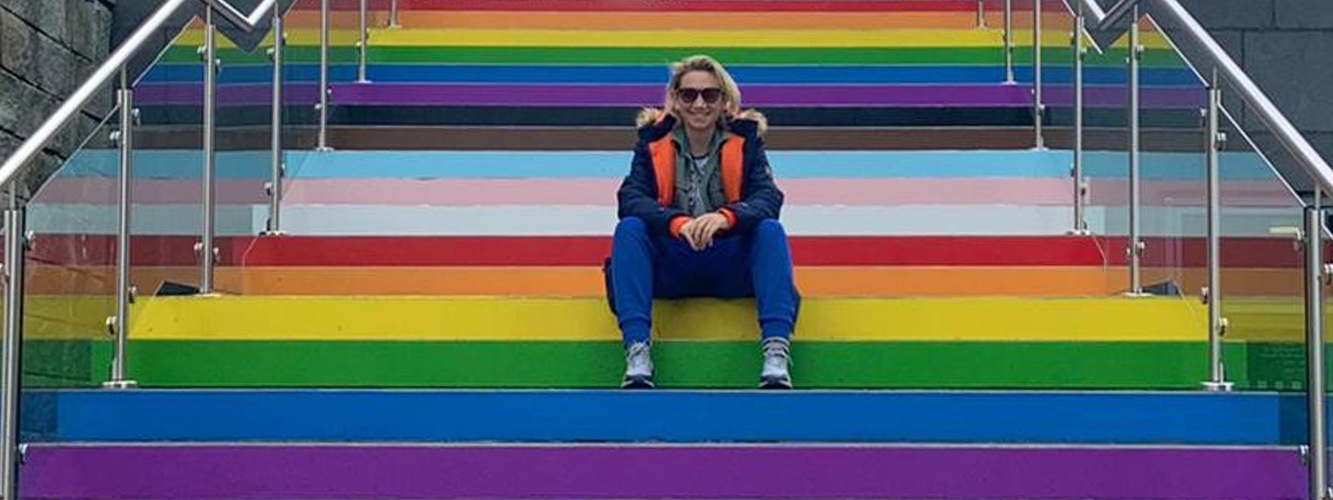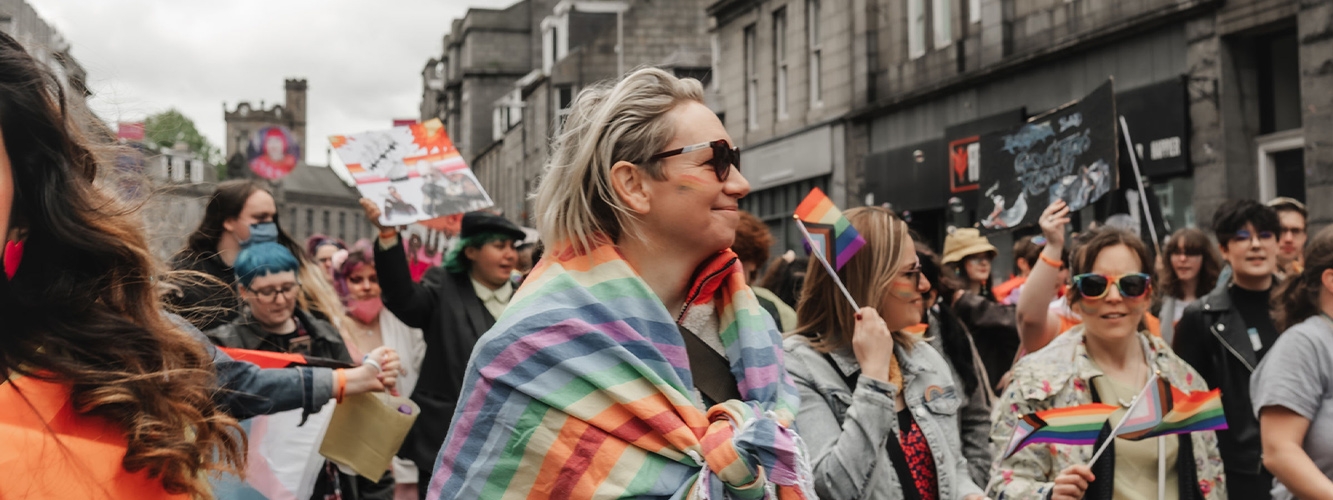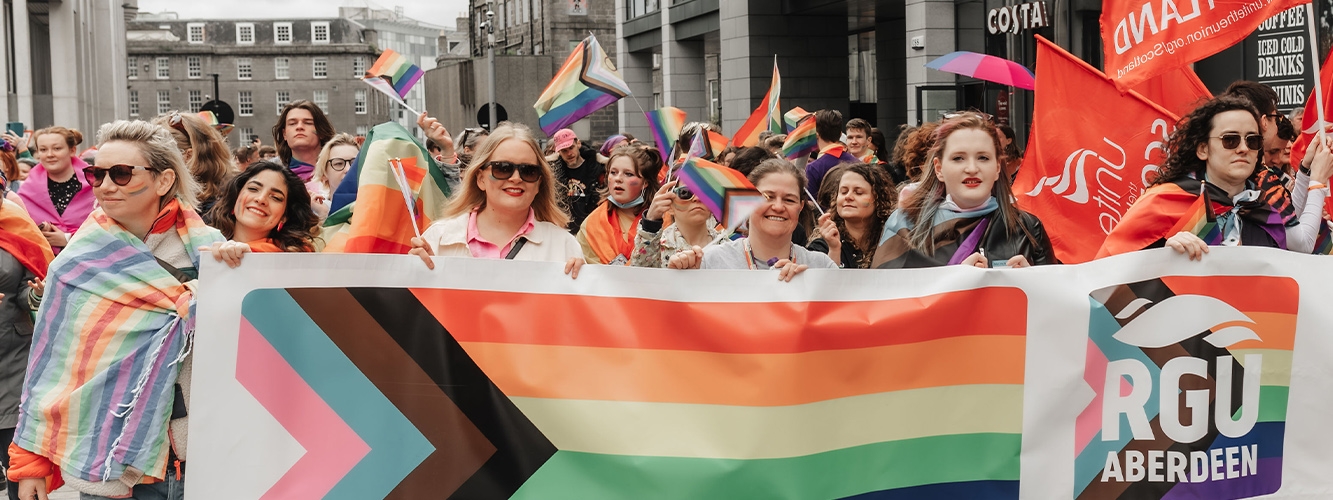Pride beyond Pride
As Pride month 2022 draws to a close, Catherine shares an insight into her own experiences and reflects on how, in its 50th year, Pride continues to be an important beacon of visibility, unity, and progression.
“Catherine, why have you written ‘it’s coming home’ next to the rainbow flag painted on your arm?”
“Because England are playing Sweden in the World Cup quarter-finals this afternoon and I’m meeting friends to watch it after the march—I can’t wait!”
“Boring! You do know that today is not actually about football? It’s about having fun! Can you just put this glitter on your face and not mention the football? Think disco, okay?”
Pride, London, 7 July 2018. A group of us were on our way to watch my partner Beth, a spoken word artist, perform on the Women’s Stage at Leicester Square before meeting colleagues at Regent’s Park for our march alongside thousands of others through the sun-drenched city. The person who was administering glitter and reprimands on the tube—let’s call her Jo—is a heterosexual woman with mostly gay male friends, and a devotion to watching re-runs of RuPaul’s Drag Race. She had brought us all rainbow garlands and spent most of the journey singing ‘We Are Family’ and pep-talking us to “get ready to be fabulous, darlings!”
Jo and Beth had studied Drama at university together, and I loved being around their extrovert energy. What I didn’t love that day was being given instructions about what Pride involved, and about how I should (or in this case shouldn’t) show up for it. I also didn’t love that these instructions were being issued to me by a heterosexual woman, but I was very much aware that in her excitement she was calling up the most recognisable expressions of the Pride brand: sparkles, dance music, banners, extravagant costumes, singing, face paint and exuberant gestures. Being ‘fabulous, darlings!’.
I’d been really looking forward to Pride that morning but wasn’t feeling especially ‘disco’ in that moment. I was thinking about Beth, who had travelled into central London earlier for a rehearsal, and who was messaging me about her understandable pre-performance nerves. I was thinking about meeting my colleagues later that day, and about walking through central London holding a banner emblazoned with my employer’s logo in huge rainbow-treated letters. I was also thinking about what Pride meant to me as a gay woman.
I’d been an undergraduate in the mid-1990s, and every other Tuesday evening I would take the bus onto campus from my hall of residence on the other side of the city. Making my way through the corridors of a dark and otherwise unfamiliar building. I would knock on the door of a discreetly located little room and spend a couple of hours with fellow members of my university’s LGB Soc, as it was called back then.
"...the newly launched internet opened a world of stories, connections and insight"
Alongside our student peers in the lecture halls and seminar rooms of our degree studies, we in the LGB Soc were learning about ourselves through the newly acquired freedoms of university life as young gay and bisexual adults who’d just moved away from home for the first time. Many of us had little or no experience of sexuality being a common ground on which to establish friendships. One thing we did establish quickly was a collective sense of being in the margins. There were no rainbows in these rooms. No mobile phones. No Google. No social media. Most of us were still teenagers, many introverted, our social skills adapting from the familiar parameters of school to the apparent limitlessness of new networks and no curfews. In her recent ground-breaking show Nanette—watch it on Netflix—Hannah Gadsby asks, “where are the quiet gays supposed to go?”. For me, at university in 1996, it was room B403, from 7-9pm every other Tuesday.
Having moved away to university from a strict, religious, academically focused school, and a loving but conservative family, I was discovering a new abundance of social choices and visual cues that would enable me to connect at last with like-minded others. During Freshers’ Week, I cut my hair short, having previously considered it a provocative and exposing act. I joined the women’s football club. I got my upper left ear pierced. I wore a shirt and tie on nights out.
I was studying English Literature, so spent a lot of time in libraries and bookshops. I’d always look for the ‘Alternative Fiction’ section, and for stories about others who I could relate to in the context of my sexuality. If these sections did exist, they were tucked away, and offered a small selection of titles, usually imported from the US, and mostly gay male oriented. During that period, I read a lot of Jeanette Winterson, author of Oranges Are Not the Only Fruit. The only other lesbian fiction I could find seemed to presume a fixation with crime, ghosts, and generally having a pretty introspective, miserable time. And, not one disco scene.
Within the three years of my undergraduate degree, the ‘Alternative Fiction’ section in Waterstones tripled in size, and the newly launched internet opened a world of stories, connections and insight. I stayed on at university to study for a master's degree and had enough material (just about) to write my final dissertation on lesbian identities in Western fiction. There were more ‘gay friendly’ bars and clubs opening; more positive representation in the media and on television; more of a palpable sense of freedom for LGB Soc in room B403. It was an exhilarating period of change, challenge, increasing confidence, discovery and fun.
But throughout this time, one supposedly pivotal part of my growth as a gay woman never happened. I never ‘came out’.
When I was younger, I’d heard that you were ‘not really gay’ until you’d ‘come out’ via ‘the talk’ to family, friends, and other networks. In truth, I’d never really understood what I was supposed to be coming out from, or where I was coming out into. I have always understood that ours is a heteropatriarchal society, and that heterosexuality is presumed. Right-handedness is presumed. Eating meat is presumed. Lots of things are presumed. But why is it anyone’s responsibility to accept and perpetuate a presumption about something that isn’t true or doesn’t work for them, by asking someone else to accept their right to make different choices? To quote Hannah Gadsby again, “This tension is yours. I am not helping you anymore. You need to learn what this feels like, because this tension is what not-normals carry inside of them all of the time.”
I’m left-handed and have always just got on with my writing. Any smudging of the ink is my issue to deal with. It doesn’t affect anyone else, and it doesn’t define me. I don’t eat meat, but I’ve always made sure I’m getting the nutrition I need from the food I like. It’s a part of my life. My sexuality is also part of my life, but like writing and the way I eat, it doesn’t define me. Have I ever felt compelled to make a point of telling someone that I happen to be left-handed, that I choose not to eat meat, or that I happen to be dating a woman? No. Have I ever felt the need to brace myself for ‘the talk’, to announce my sexuality to someone, and hope they’ll accept or love me regardless? No. Do I expect anyone to do that with me? Absolutely not. How can I do my part to really challenge presumptions unless I’m demonstrating my right and capacity to live happily in the world like everyone else, regardless of who I choose to do that with?
"Pride month will also continue to be a vital demonstration of solidarity..."
I know and respect that, for many people, coming out is still incredibly important. For reasons there’s not room to share in this piece, I had decided at a fairly young age that I would never do this; that I would never ask anyone to ‘accept’ me for having a sexuality that was different to the majority, and that I would certainly never seek permission to have the private life of my choosing. That decision is the root of my personal pride: the one I carry with me 365 days a year.
Pride, Aberdeen, 28 May 2022. My first Pride in Scotland. It was so much fun to meet up with colleagues and students from across the vibrant and diverse LGBTQIA+ community at RGU, and to walk together down Union Street as part of a bustling, colourful and joyous parade. One of the reasons I relocated over 500 miles from London to join RGU last year was the opportunity to join a university with such a strong values-oriented culture, and I was delighted to discover our rainbow steps on campus as one expression of that.
It will always be a privilege to engage with Pride month as a public acknowledgement of our personal journeys as ‘not-normals’. Pride month enables us to keep reflecting on our individual and collective pasts, to celebrate how far we’ve come, and to take up space with joy and confidence. Pride month will also continue to be a vital demonstration of solidarity: of fighting for and amplifying the voices of those who continue to be vilified, marginalised, attacked, or killed for simply wanting to live and love authentically. Pride month is also—and will always be—about honouring those who’ve walked in fear through the streets and cities in which I am now lucky enough to rarely think twice about holding my partner’s hand.
As Pride month wraps up, organisations will revert to their non-rainbow-treated logos, the colourful window displays in shops will be dismantled, and the rainbow flags will be put away till next summer. For so many of us though, the experience of Pride never stops. It’s in our everyday choices, our words, our actions, and our relationships. It’s in our hearts. We will, individually and together, keep stepping towards a future where living authentically with love anywhere in the world no longer feels like a privilege. We’ve got a way to go still, but we’ll get there—covered in glitter or not—because love wins. Love always wins.



